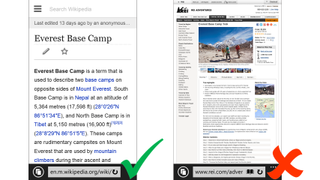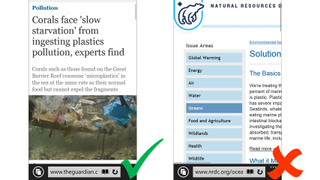Microsoft Ranking Mobile-Friendly Sites Higher In Bing, Following Google's Lead
Microsoft announced that it's going to adopt a similar policy to the one Google recently implemented by giving mobile-friendly websites a higher ranking in its Bing search engine.
A few months ago, Google announced that it's going to give a bigger boost to mobile-optimized websites in its own search engine. More and more people visit the Web from their mobile devices, and they are often disappointed to discover that too many websites don't display well on their small screens and are thus harder to use.
Google aimed to rectify that problem by encouraging web developers to care more about how their websites look on mobile. Google promised that it will continue to prioritize overall search query relevance, but if two websites are more or less equal in terms of SEO strength, then the one with the mobile-optimized site will rank higher.

Microsoft has been experimenting with "Mobile Friendly" tags for websites that have appeared in its search engine since last year. What it found is that Bing users can satisfy their information needs faster when the websites are optimized for mobile.
The company has a few straightforward criteria that can help it identify with a high degree of accuracy whether a website is optimized for mobile:
1) Large buttons

The navigation buttons, as well as links and other clickable items, should be large enough to tap. On websites that aren't mobile-friendly, that's usually not the case.
Stay On the Cutting Edge: Get the Tom's Hardware Newsletter
Get Tom's Hardware's best news and in-depth reviews, straight to your inbox.
2) Large font

On websites that are not optimized for mobile, the font is usually too small and condensed, and you have to zoom in on the page to see it at a more acceptable size. Microsoft's algorithms can see which websites have a large enough font for mobile.
3) No horizontal scrolling

Many desktop-only websites also force horizontal scrolling for their web pages, which is a dead giveaway that the website isn't mobile-friendly.
4) Compatibility

Microsoft also checks to see if the websites are displaying content that is compatible with the devices on which they are shown. For instance, this could include Flash content attempting to display on an iPhone. iPhones (or the majority of mobile devices today) can't show Flash content, so Microsoft would mark this as a compatibility issue.
Microsoft will start enhancing the ranking of mobile-friendly sites in the coming months, and in a few weeks it will begin rolling out a tool Webmasters can use to analyze their pages for mobile friendliness.
Follow us @tomshardware, on Facebook and on Google+.
-
Morbus I find this to be intrusive, and only reinforces my choice of using duckduckgo.com instead.Reply
I mean, if I search on mobile, I can accept that google and bing automatically filter out non-mobile websites, or drop them down the list. It's only fair. But I don't feel that it's all right if I'm searching on my three-screen desktop PC. -
PaulBags Can they please rank WAY down sites with MASSIVE persistant top bars? Taking up a fifth or more of screen space for the sites name and a menu button is unacceptable on mobile.Reply -
ohim This is a stupid move from MS/Google, most of the important work is done on a PC and i`ll be fed mobile friendly sites first instead of relevance ... why are we pushing mobile so much ? usually mobile users are just facebook/instagram people that don`t do much work and sit on their devices all day.Reply
And then you have a guy who`s working on a PC and like MOrbus said .. maybe on a 3 screen PC and he`ll be fed Mobile friendly sites in searches ... they should make a button for mobile search relevance ... not force it to everyone.
Browsing on a phone is stupid anyway .. i find it slow and tedious to do anything .. PC is still the king of working anything. -
PaulBags Browsing on mobile is stupid... until you have hours of unexpected down time with nothing for entertainment but what's in your pockets, or you're traveling public transport (same thing), or your friends computer burps up a derp and they only way to get functioning ethernet/wireless adapter drivers is downloading by mobile internet, or you're at the supermarket and want to know what X ingredient is, etc etc.Reply
In the end isn't information being avalible, easily and readily, more important than platform bashing? -
thrus I may have misread but I thought Google's plan was to do the ranking thing when searching from a mobile. I assumed (dumb to do I know) that Bing would be the same process.Reply -
nukemaster Well at least from the screen shot, It looks like the mobile version of Bing is doing it.Reply
I did not see anything like that when I just checked and using an agent switcher for my browser I got the mobile site, but it is still not ranking this way yet.
Most Popular





